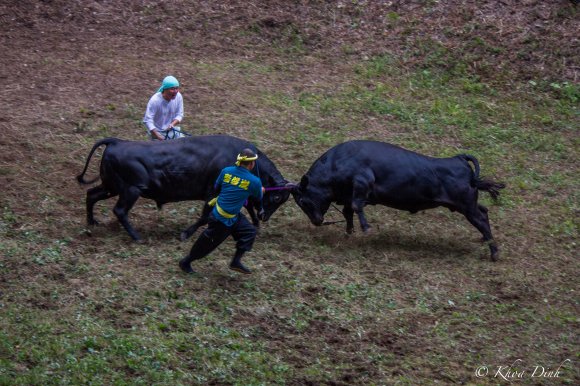
Starting this week, RocketNews24 will feature blogs written by people living in Asia who we hope can offer a unique glimpse at the country they call home. The first of these is You, Me, And a Tanuki by one of our own writers, Michelle. Originally from California, Michille is currently one of only two foreigners living in a tiny fishing village on one of the Oki islands in Japan. We’re still looking for more unique and interesting stories from Asia to share with the world, so drop us a line if you’d like to have your own blog featured on RocketNews24.
The Oki Islands, nestled in the Sea of Japan, have a tumultuous history. Once used as a place of exile for fallen emperors, the islands have been shaped by its unique past and transformed into an area rich in traditional culture and events. One such event is ushi-tsuki, or bull sumo. Used as a form of entertainment for the exiled Emperor Gotoba and dating back to 1221, the tradition of bull sumo is still proudly preserved by the local people of Oki.
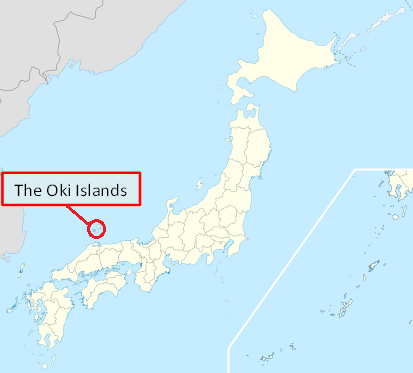
Unlike the famous “man vs. beast” bull fighting of Spain, Oki’s bull fighting pits bull against bull in a fair battle of brute bovine strength. The match is over when one bull gives up and runs away and neither bull is injured in the ring. There are even weight classes and bulls of comparable weight fight against each other. Humans are present in the ring, but only play a supporting role facilitating the fight.
In the photo above, you can see two men holding on to ropes attached to the bull’s nose. The men are there to watch over the bulls and pull them away in case the fight needs to be stopped. At times, these men are more like cheerleaders, supporting the bull and encouraging him to fight hard with shouts of “ii zou!” (that’s right!) or “daijyoubu!” (it’s OK!).
The bulls are treated similar to their human sumo wrestler counterparts. Much like traditional Japanese sumo, the ring is purified using salt before the fight begins.
The strongest bulls are even able to achieve the title of yokozuna, champion status bestowed on human sumo wrestlers.
During the fights leading up to the main event, younger, inexperienced bulls are only allowed to battle for a few minutes. When time is up, the bulls are coaxed apart and sent back through the crowd to their holding area (usually a tree with a rope tied to it).
During one of the main event matches, a bull turned tail and fled from the fight, losing his match. The rope slipped from the facilitator’s grasp and the fleeing bull managed to get around to the back side of the champion bull and gored him in the right flank. The facilitator of the champion bull was so enraged to find that his bull was injured (something that is very uncommon in Oki bull fighting) that he began screaming at the officials and the other bull handler.
It was very touching to see how upset this man was at the sight of his bull being injured. These people spend hours a day training and caring for their animals and the bulls are treated as beloved family members.
The bull sumo arena in the Tsuma area of Okinoshima was nestled between two hills in the middle of a Japanese cedar forest. The hills served as a holding area for the bulls and were joined in the middle by a low dip in the land, forming the stadium.
It was as if we were stepping into another world where man and beast peacefully coexist. A few hundred people had gathered at the stadium, perched on fallen tree trunks or simply sat in the dirt. Massive bulls tied to pin-straight cedar trees by laughably thin ropes stood near the spectators, awaiting their turn to battle. These giant bulls, some weighing in at over one ton, were as docile as a sleepy kitten, just happy to be resting amongst the trees. When a girl of about four went skipping between the bulls, the enormous animals just casually looked at her as she went on her merry way. Seeing this, I even questioned if the bulls were fierce enough to participate in the fighting.
There was something so wild and almost spiritual about the whole event, it made me wish I could return to the simpler times where animals and humans mutually respected each other. I’ve been told that the bulls are taken for daily walks through the neighborhood to help keep them in shape. It isn’t uncommon to see a withered farmer leading an enormous bull through the streets in the early morning.
Before watching Oki’s bull sumo, I wasn’t expecting much. I even had an image of the event being just a couple of angry bulls tussling around in the dirt while spectators madly cheered on. I couldn’t have been more wrong. Oki bull sumo is a wondrous event where even the most casual of observer is able to tangibly feel the sense of pride and honor participants have for their island’s tradition. The sense of community and camaraderie that ushi-tsuki instills in its people is heartwarming. I feel honored to have had the chance to witness such a unique and powerful tradition that is still alive in the sleepy island communities of Oki.
Michelle is originally from California, but currently living in the tiny fishing village of Chibu, one of the Oki islands in Japan. Being one of two foreigners living in an island village of a little over 600 people presents many adventures. Come back every Saturday for a new article featuring the interesting and bizarre things she comes across in her life in rural Japan. Once a week not enough? Check out her blog, You, Me, And A Tanuki, for photographs and even more articles.

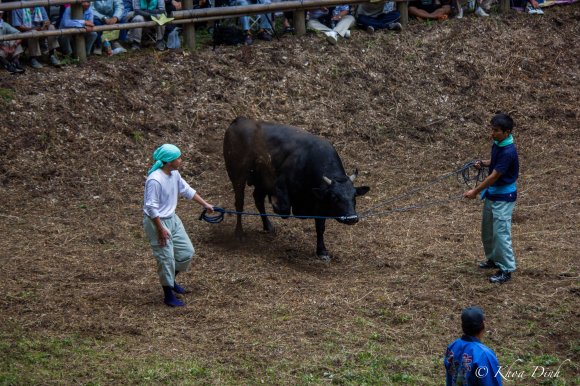
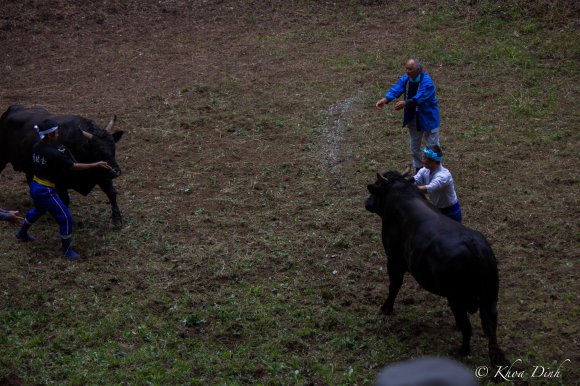
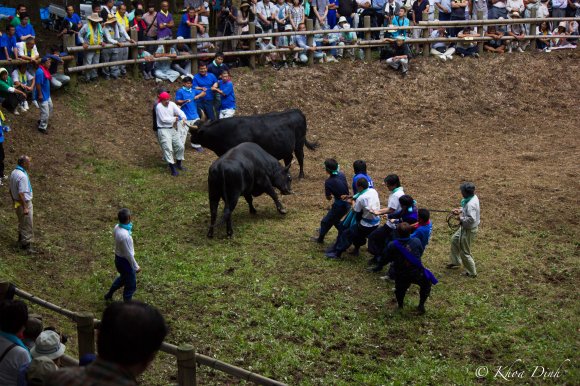
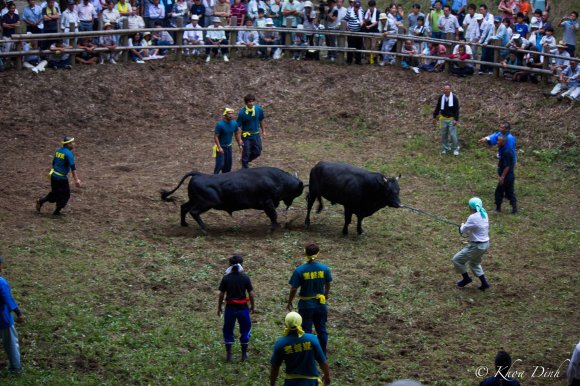
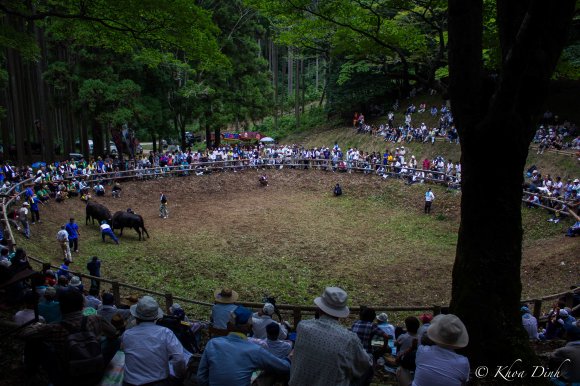
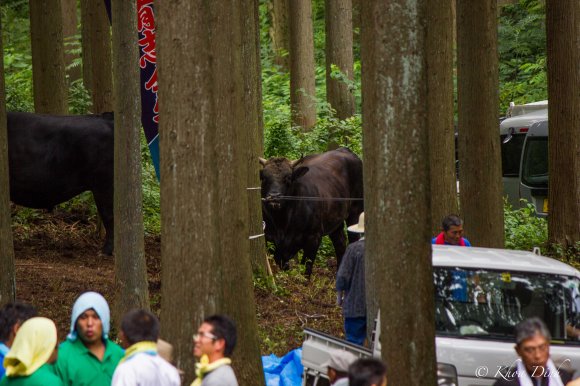
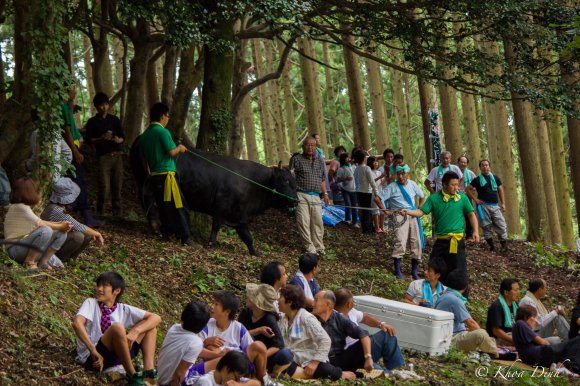
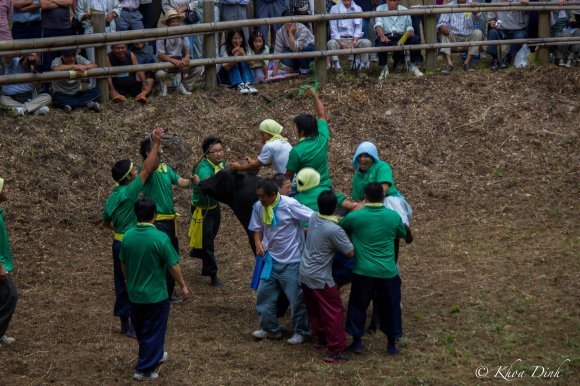
 Red Bull kills Gundam as it dumps anime’s most famous mecha into Kobe’s harbor 【Video】
Red Bull kills Gundam as it dumps anime’s most famous mecha into Kobe’s harbor 【Video】 ‘Cows can marry’ and other fascinating bovine facts from India
‘Cows can marry’ and other fascinating bovine facts from India Legendary DJ Krush performs with traditional Japanese musicians to create music for your dreams
Legendary DJ Krush performs with traditional Japanese musicians to create music for your dreams Travis Japan members compete with the best dancers in Japan at Red Bull’s national dance finals
Travis Japan members compete with the best dancers in Japan at Red Bull’s national dance finals “The hell with sound judgement” says Red Bull in ad, but Japanese people don’t seem to agree
“The hell with sound judgement” says Red Bull in ad, but Japanese people don’t seem to agree McDonald’s new Happy Meals offer up cute and practical Sanrio lifestyle goods
McDonald’s new Happy Meals offer up cute and practical Sanrio lifestyle goods Studio Ghibli glasses cases let anime characters keep an eye on your spectacles
Studio Ghibli glasses cases let anime characters keep an eye on your spectacles All-you-can-drink Starbucks and amazing views part of Tokyo’s new 170 meter-high sky lounge
All-you-can-drink Starbucks and amazing views part of Tokyo’s new 170 meter-high sky lounge Super Nintendo World expansion gets delayed for several months at Universal Studios Japan
Super Nintendo World expansion gets delayed for several months at Universal Studios Japan Kyoto’s 100 Demons yokai monster parade returns!
Kyoto’s 100 Demons yokai monster parade returns! More foreign tourists than ever before in history visited Japan last month
More foreign tourists than ever before in history visited Japan last month We cooked Japan’s 2,000-yen mail-order Ramen of the Year, but was it worth it?【Taste test】
We cooked Japan’s 2,000-yen mail-order Ramen of the Year, but was it worth it?【Taste test】 The oldest tunnel in Japan is believed to be haunted, and strange things happen when we go there
The oldest tunnel in Japan is believed to be haunted, and strange things happen when we go there Hey, Japanese taxi driver! Take us to your favorite restaurant in Tsuruga City!
Hey, Japanese taxi driver! Take us to your favorite restaurant in Tsuruga City! What happens when you use a facial massage roller for two weeks straight?
What happens when you use a facial massage roller for two weeks straight? Disney princesses get official manga makeovers for Manga Princess Cafe opening in Tokyo
Disney princesses get official manga makeovers for Manga Princess Cafe opening in Tokyo Starbucks reopens at Shibuya Scramble Crossing with new look and design concept
Starbucks reopens at Shibuya Scramble Crossing with new look and design concept Beautiful new Final Fantasy T-shirt collection on the way from Uniqlo【Photos】
Beautiful new Final Fantasy T-shirt collection on the way from Uniqlo【Photos】 Is the new Shinkansen Train Desk ticket worth it?
Is the new Shinkansen Train Desk ticket worth it? Foreign English teachers in Japan pick their favorite Japanese-language phrases【Survey】
Foreign English teachers in Japan pick their favorite Japanese-language phrases【Survey】 Japanese convenience store packs a whole bento into an onigiri rice ball
Japanese convenience store packs a whole bento into an onigiri rice ball We try out “Chan Ramen”, an underground type of ramen popular in the ramen community
We try out “Chan Ramen”, an underground type of ramen popular in the ramen community Studio Ghibli releases Kiki’s Delivery Service chocolate cake pouches in Japan
Studio Ghibli releases Kiki’s Delivery Service chocolate cake pouches in Japan Japan’s bone-breaking and record-breaking roller coaster is permanently shutting down
Japan’s bone-breaking and record-breaking roller coaster is permanently shutting down New definition of “Japanese whiskey” goes into effect to prevent fakes from fooling overseas buyers
New definition of “Japanese whiskey” goes into effect to prevent fakes from fooling overseas buyers Our Japanese reporter visits Costco in the U.S., finds super American and very Japanese things
Our Japanese reporter visits Costco in the U.S., finds super American and very Japanese things Studio Ghibli unveils Mother’s Day gift set that captures the love in My Neighbour Totoro
Studio Ghibli unveils Mother’s Day gift set that captures the love in My Neighbour Totoro Foreign passenger shoves conductor on one of the last full runs for Japan’s Thunderbird train
Foreign passenger shoves conductor on one of the last full runs for Japan’s Thunderbird train Domino’s Japan now sells…pizza ears?
Domino’s Japan now sells…pizza ears? New Japanese KitKat flavour stars Sanrio characters, including Hello Kitty
New Japanese KitKat flavour stars Sanrio characters, including Hello Kitty Kyoto creates new for-tourist buses to address overtourism with higher prices, faster rides
Kyoto creates new for-tourist buses to address overtourism with higher prices, faster rides Sales of Japan’s most convenient train ticket/shopping payment cards suspended indefinitely
Sales of Japan’s most convenient train ticket/shopping payment cards suspended indefinitely Sold-out Studio Ghibli desktop humidifiers are back so Totoro can help you through the dry season
Sold-out Studio Ghibli desktop humidifiers are back so Totoro can help you through the dry season Japanese government to make first change to romanization spelling rules since the 1950s
Japanese government to make first change to romanization spelling rules since the 1950s Ghibli founders Toshio Suzuki and Hayao Miyazaki contribute to Japanese whisky Totoro label design
Ghibli founders Toshio Suzuki and Hayao Miyazaki contribute to Japanese whisky Totoro label design Doraemon found buried at sea as scene from 1993 anime becomes real life【Photos】
Doraemon found buried at sea as scene from 1993 anime becomes real life【Photos】 Tokyo’s most famous Starbucks is closed
Tokyo’s most famous Starbucks is closed One Piece characters’ nationalities revealed, but fans have mixed opinions
One Piece characters’ nationalities revealed, but fans have mixed opinions We asked a Uniqlo employee what four things we should buy and their suggestions didn’t disappoint
We asked a Uniqlo employee what four things we should buy and their suggestions didn’t disappoint Princesses, fruits, and blacksmiths: Study reveals the 30 most unusual family names in Japan
Princesses, fruits, and blacksmiths: Study reveals the 30 most unusual family names in Japan Japanese freestyle soccer maestro drops jaws with mind-blowing juggling skills in New York
Japanese freestyle soccer maestro drops jaws with mind-blowing juggling skills in New York Nagoya NPO releases survival guide for hikikomori for when their parents are gone
Nagoya NPO releases survival guide for hikikomori for when their parents are gone Students at Tokyo University of the Arts create amazing festival shrines of giant monsters 【Pics】
Students at Tokyo University of the Arts create amazing festival shrines of giant monsters 【Pics】 Bull suddenly rams into a sedan at railroad crossing in China, captured on video
Bull suddenly rams into a sedan at railroad crossing in China, captured on video Red Bull unveils new Japan-exclusive grape flavor
Red Bull unveils new Japan-exclusive grape flavor Fans share photos of complete pandemonium while waiting to buy Kira Festival 2016 merchandise
Fans share photos of complete pandemonium while waiting to buy Kira Festival 2016 merchandise Video shows how computers can become veritable roach motels
Video shows how computers can become veritable roach motels It sounds like HTC’s new phone is going to have an incredible camera
It sounds like HTC’s new phone is going to have an incredible camera Major telecom company to give 200-yen apology payouts to 35M people
Major telecom company to give 200-yen apology payouts to 35M people They’re back! Pikachus overrun Yokohama for second straight year and dance up a storm! 【Videos】
They’re back! Pikachus overrun Yokohama for second straight year and dance up a storm! 【Videos】 Watch Ryu from Street Fighter unleash a shoryuken combo on a Red Bull can in epic stop motion
Watch Ryu from Street Fighter unleash a shoryuken combo on a Red Bull can in epic stop motion Japanese coffee maker’s commercial is dark, milky, and udderly crazy 【Video】
Japanese coffee maker’s commercial is dark, milky, and udderly crazy 【Video】 Akihabara store praised for “God-like” customer service
Akihabara store praised for “God-like” customer service Vegans rejoice! Japanese vegan fair celebrates meatless meat, organic cola, vegan pet food
Vegans rejoice! Japanese vegan fair celebrates meatless meat, organic cola, vegan pet food Godzilla Energy drink is here, looks like a beam of Shin Godzilla’s atomic breath【Taste test】
Godzilla Energy drink is here, looks like a beam of Shin Godzilla’s atomic breath【Taste test】 What’s it like to watch a sumo tournament in Tokyo during the pandemic?
What’s it like to watch a sumo tournament in Tokyo during the pandemic?
Leave a Reply